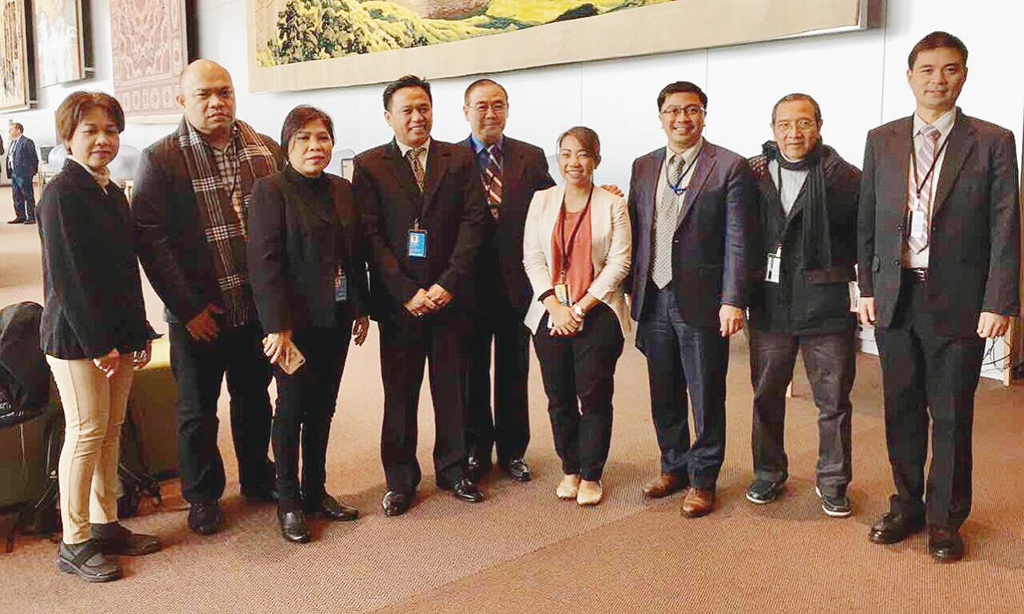
“All States have customary and treaty obligations to protect and preserve the marine environment and its resources,” a reminder from the United Nations Convention on the Law of the Sea (UNCLOS)
In the Resolution 69/292 of June 2015, the United Nations General Assembly (UNGA) decided to develop a new international legally binding instrument (ILBI) under the UNCLOS on the conservation and sustainable use of marine biodiversity of areas beyond national jurisdiction (BBNJ).
Also, UNGA decided to establish the Preparatory Committee (PrepCom), an intergovernmental conference, to make substantive recommendations and elaborate the text of the ILBI. PrepCom started its work in 2016 and will report on its progress by the end of 2017.
The Philippines sent a delegation to the third session of the Preparatory Committee on March 27 to April 7, 2017 at UN Headquarters, New York City.
The Philippine Council for Agriculture and Fisheries (PCAF) was among the agencies tapped by the Department of Foreign Affairs (DFA) to participate in the meeting together with Bureau of Fisheries and Aquatic Resources (BFAR), Department of Environment and Natural Resources – Biodiversity Management Bureau (DENR-BMB), University of the Philippines – Marine Science Institute (UP-MSI), and Southeast Asian Fisheries Development Center (SEAFDEC).
For PCAF, it was attended by the Planning, Monitoring, and Knowledge Management Division (PMKMD) Chief Estrella Tulay and Sarah Bales, Focal Person for Committee on Fisheries and Aquaculture (CFA), Policy Development Coordination Division (PDCD).
The PrepCom3 was chaired by Carlos Sergio Sobral Duarte, Ambassador and Deputy Permanent Representative of Brazil to the United Nations.
The conference was attended by the UN Member States to continue discussions on the draft text of an international agreement to manage biodiversity in the high seas.
Informal working group discussions
The third session of the PrepCom was expected to make substantive progress on developing the building blocks of a new ILBI on marine biodiversity in the deep seas.
During the two-week session, delegates met in informal working groups and in plenary to consider: marine genetic resources (MGR), including questions on benefit-sharing; measures such as area-based management tools (ABMT), including marine protected areas (MPA); environmental impact assessments (EIA); capacity building and marine technology transfer (CB&TT); and cross-cutting issues, such as the scope of an ILBI, its relationship with other instruments, and its institutional arrangements.
Discussions focused on the legal regime applicable to marine genetic resources of areas beyond national jurisdiction (ABNJ) with views still divergent on the applicable legal regime, namely the common heritage of mankind or the freedom of the high seas.
Different views were expressed as to whether the common heritage of mankind and the freedom of the high seas are mutually exclusive or could apply concurrently in an international instrument.
The talks on access and benefit sharing looked into how and what regulations are needed.
Suggestions ranged from the institution of a notification requirement, to a prior informed consent procedure, access permits and fees, and conditioning access to payments to a benefit-sharing fund.
Participants also recommended the establishment of a clearing-house mechanism (CHM) for information sharing and for matching needs and available expertise.
Delegates addressed governance models, considering three options suggested by the chair of ABMTs, including MPAs, which include the “global model,” “hybrid model,” and “regional and/or sectoral model.”
Global model establishes a global institution to consider and decide on ABMT proposals; hybrid model reinforces regional and sectoral organizations’ mandates through regional coordination mechanisms, and providing global guidance and oversight; and regional and sectoral model recognizes regional and sectoral bodies’ authority for decision making, monitoring and review of ABMTs.
The informal working group also had a substantive exchange of views which assisted in better understanding how EIAs may be addressed in the ILBI.
During the discussion, two different approaches on how to deal with transboundary EIAs were put forward namely: “activity-oriented” which based on the location of the activity, not the location of the impacts; and “impact-oriented” that based on the location of the impact, not the location of the activity.
The inclusion of the strategic environmental assessments (SEAs) in the international instrument was also tackled.
SEAs were described as useful for, inter alia, addressing cumulative impacts and conducting subsequent project based EIAs.
UNCLOS called for the development of capacity building and marine technology transfer. It is vitally important tool to conserve and sustainably use marine biological diversity of areas beyond national jurisdiction.
The Philippines provided a list of critical areas for capacity development, including marine taxonomy, bioinformatics, and implementation of EIAs and ABMTs.
There were divergent views on the utility of developing a list of CB&TT activities for inclusion in the international instrument.
Participants recommended that it will be only considered useful if it was indicative, non-exhaustive, and flexible. Suggestions were made that types of CB&TT could be dealt with on a case-by-case basis, or that only general categories should be specified.
On cross-cutting issues, delegations debated how to avoid undermining existing regional and sectoral bodies, and how the ILBI could interface with other agreements and conventions.
For instance, the Caribbean Community (CARICOM) suggested that “not undermining” involves non-duplication, coherence and coordination, addressing existing gaps.
The EU stressed that the ILBI should respect the balance of rights and obligations under UNCLOS, and the competence of other bodies.
Morocco emphasized that the ILBI should not affect existing instruments’ effectiveness, while Guatemala, with Mexico, proposed “not contradicting or weakening” existing instruments’ mandates.
PrepCom3 was largely seen as the last fully substantive session, because the fourth and final sessiom in July will need to reach agreement on recommendations to the General Assembly on whether to convene an intergovernmental conference to shift the process to a final negotiating phase.
The last session of PrepCom will convene on July 2017. -LC, with reports from International Institute for Sustainable Development (IISD) and United Nations (UN)











